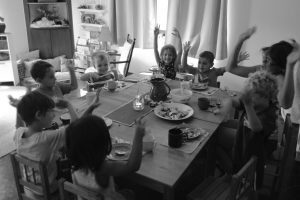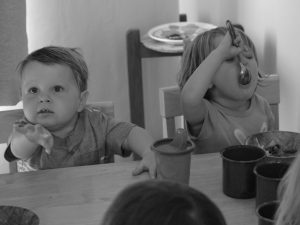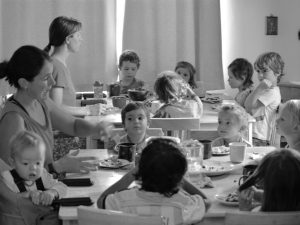At Rose Rock School, each meal time is a wholly nourishing experience. It is an experience that feeds our senses with a variety of colors, textures, aromas, flavors, and conversation. It is something that sets the tone for the day and builds lasting, healthy relationships.
We work to provide this experience for the children because we recognize that the food on our plates can do more than satisfy an empty stomach. Wholesome food, providing sources of both quick and long lasting energy, fuel the children for robust play. It gives the children the experience of a strong and healthy body, and over time they learn to relate this feeling with how they eat.
Anthroposophy* sets forth the idea that we must consider the various qualities, including the spiritual nature, of the food we ingest. This philosophy serves as a lens of evaluation in determining the qualities of the food that we at Rose Rock prepare and offer in order to nourish a child’s whole being. It leads to a plethora of questions: Organic or conventional produce? Vegetarian or omnivore? Humanely treated animals or conventional practices? Grains or grain-free? What is the story and “gesture” of our food and how does it serve us?
We must also consider the gesture of the whole experience because every stage of preparing a meal can enrich a child’s development.  The experience cultivates a personal relationship with nature and humanity. Whether our garden is large or small, it is essential for us to plant, grow and harvest some of our own foods. When we involve the children in this process, they understand that their food comes from the earth. They dig with us, water, and weed with us. They fail with us, and rejoice with us when a harvest is good. They cut vegetables and bake bread. They taste the extra richness of a meal made with ingredients they grew or helped to prepare. It is the beginning of a beautiful story about the hard work of the many people it takes, between the farm and the table, to bring each meal together.
The experience cultivates a personal relationship with nature and humanity. Whether our garden is large or small, it is essential for us to plant, grow and harvest some of our own foods. When we involve the children in this process, they understand that their food comes from the earth. They dig with us, water, and weed with us. They fail with us, and rejoice with us when a harvest is good. They cut vegetables and bake bread. They taste the extra richness of a meal made with ingredients they grew or helped to prepare. It is the beginning of a beautiful story about the hard work of the many people it takes, between the farm and the table, to bring each meal together.
This experience also brings us closer to each other. At Rose Rock, all meals–except for Picnic Fridays–are served around the table, family style, with wooden bowls, ceramic mugs, cloth napkins, and real forks and spoons.  A candle glows in the center, as we join hands and say a blessing. Food or bowls are passed around, as is the water pitcher. The children are encouraged to try new foods. They learn table etiquette and lively, but polite conversation. It is a reverent and joyful time for everyone.
A candle glows in the center, as we join hands and say a blessing. Food or bowls are passed around, as is the water pitcher. The children are encouraged to try new foods. They learn table etiquette and lively, but polite conversation. It is a reverent and joyful time for everyone.
From the youngest at our tables to the oldest at yours, children at every stage of development benefit from these experiences. Imagine the toddler, still so fresh to the world. The rhythm of coming together for a regular family meal instills a sense of security. The three-year-old, digging in the dirt to turn soil in the garden and drop in seeds, or the five-year-old cutting vegetables are both working on important motor skill growth. The six-year-old who is learning which veggies are ripe for picking, or the nine-year-old learning why the soil wasn’t quite right for a fruitful harvest, are learning to read subtleties in nature that could transfer to the subtleties of reading people. The adolescent who is sous-chef at many family dinners is developing self-sufficiency and a sense of fulfillment in providing for others. The family meal provides teenagers with a safe space to discuss important individual food choices at a time when critical thinking and intellectual growth are at their peak. And children, at any age, conversing and storytelling together with their family at mealtime are developing social skills that will benefit them in a myriad of ways throughout life.
In an effort to extend the experience of the Rose Rock meal, we released a school cook book last year. Our hope with this cookbook is to inspire others to bring some of the aforementioned elements to their homes. Family culture is deeply influenced by the gestures of food in the home. What gesture are your meals bringing to your family?
Certainly not every meal can be prepared and experienced exactly as the ones described above, but each meal brings an opportunity to create something nourishing and special. Even the meal picked up on the way home can bring a pause to the fast pace of a busy evening. Sitting down and saying a blessing over real dishes, instead of take-out containers and paper napkins, before moving into bedtimes and late night work, creates a gesture of togetherness and gratitude for the food which fuels our full lives.
*Anthroposophy is the philosophy behind the pedagogy of Waldorf education and LifeWays childcare. 
The Rose Rock School’s cookbook, From Our Table to Yours, is available for purchase on their website. Visit www.roserockschool.org/merchandise to purchase.